Comparative Analysis: Best FD Rates Offered by Banks in 2024
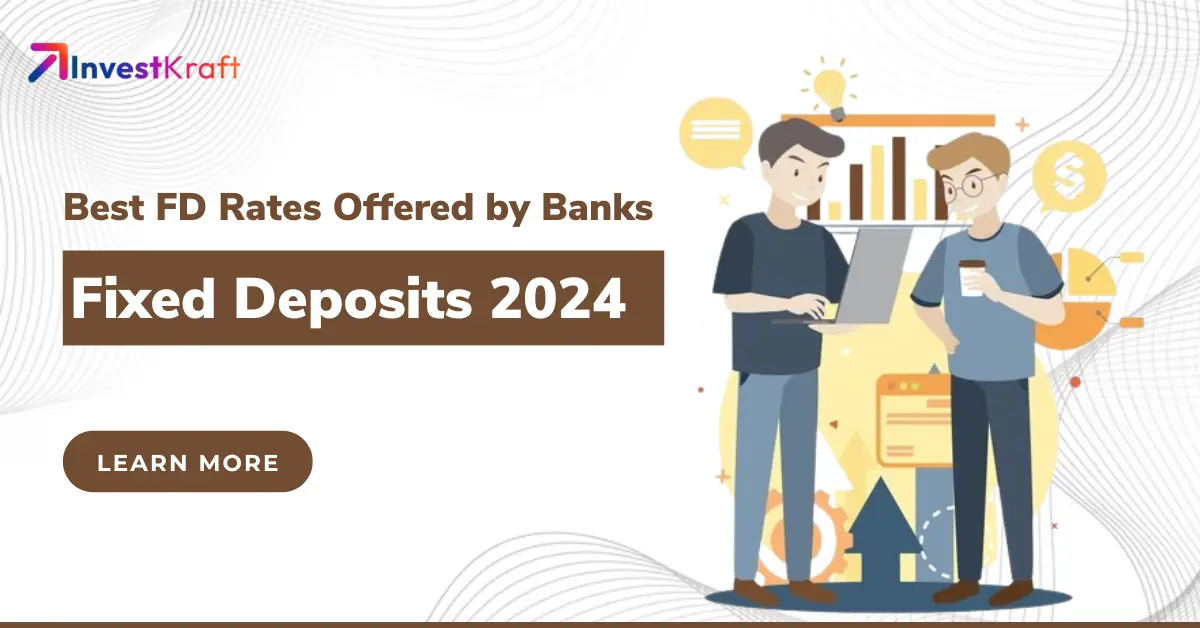
When it comes to choosing the safest and most consistent investment avenue in India, a majority of people would prefer a fixed deposit. Despite the evolution of several new investment apparatuses available in the world today, the craze for fixed deposits is now showing signs of depression. From senior citizens to housewives, working professionals, and even businessmen, fixed deposits are their all-time favorite investment tools for ages. There are lots of benefits fixed deposits offer to people – stable interest rates, superior levels of safety and security, multiple payment choices, zero market risks, income tax benefits, and more.
If you are looking to invest your hard-earned money in a fixed deposit that offers the best interest rate, here is a comparative study that highlights the best-performing fixed deposits by various banks in India.
What is A Fixed Deposit?
A fixed deposit is a money-saving instrument by banks and non-banking financial corporations (NBFCs) for people who can invest their money to get returns at a pre-set interest rate. Upon maturity, the person would get the invested amount along with the accumulated interest from the bank. Since these schemes are not market-linked, they are considered safe and secure investment avenues.
Salient Features Of Fixed Deposits From Banks
- Better security than other investment tools
- Enables investors to earn interest over a set time period
- Can invest money for up to 10 years
- No limit on the maximum amount of deposit
- Senior citizens may get a higher interest rate
Best FD Rates Offered By Banks in 2024
Below is a list of banks that offer the most attractive interest rates in 2024 on fixed deposits.
| Banks | Highest FD rate (% p.a.) | Additional interest rate for senior citizens (% p.a.) |
| AU Small Finance Bank | 8 | 0.5 |
| Bandhan Bank | 7.85 | 0.50-0.75 |
| Bank of Baroda | 4.25% - 7.25% | 4.75% - 7.75% |
| DCB Bank | 8 | 0.50-0.60 |
| ESAF Small Finance Bank | 8.25 | 0.5 |
| Equitas Small Finance Bank | 8.5 | 0.5 |
| Fincare Small Finance Bank | 8 | 0.5 |
| IDFC First Bank | 8 | 0.5 |
| Induslnd Bank | 7.75 | 0.5 |
| Jana Small Finance Bank | 8.5 | 0.5 |
| Punjab National Bank | 3.5% - 7.25% | 4% - 7.75% |
| RBL Bank | 8.1 | 0.5 |
| SBM Bank | 8.5 | 0.5 |
| Shivalik Small Finance Bank | 8.7 | 0.5 |
| Suryoday Small Finance Bank | 8.65 | 0.40-0.50 |
| Ujjivan Small Finance Bank | 8.5 | 0.5 |
| Utkarsh Small Finance Bank | 8.5 | 0.6 |
| Unity Small Finance Bank | 9 | 0.5 |
| Union Bank of India | 7.25 | 0.5 |
| YES Bank | 3.25% - 8% | 3.75% - 8.5% |
Factors Affecting FD Rates in India
One of the main factors to take into consideration when investing in fixed deposits is the interest rate. This rate directly affects the returns on your investment. In this section, we will delve into the various factors that influence fixed deposit rates and examine how they can impact the returns you can anticipate from your investment:
- Economic conditions affect fixed deposit interest rates. Rates are higher in economic growth and stability, lower in uncertainty or recession to stimulate borrowing and spending.
- Central Bank’s decisions impact fixed deposit rates. A higher repo rate leads to higher fixed deposit rates, lower repo rate leads to lower fixed deposit rates.
- Inflation erodes purchasing power. Fixed deposit rates should keep pace with inflation to retain value. Financial institutions adjust rates based on inflation. Higher inflation may lead to higher fixed deposit rates.
- Loan demand impacts fixed deposit rates. High demand leads to higher rates to attract funds while low demand results in lower rates.
- Banks offer higher fixed deposit rates when in need of funds.
- Longer fixed deposit durations typically offer higher interest rates to encourage long-term investment.
- Competition among banks can lead to varying fixed deposit interest rates, offering differences for similar tenures.
- Regulatory bodies set rules for bank interest rates, affecting fixed deposit rates. Banks must follow these rules when setting rates
- Bank’s stability and credit rating impact deposit interest rates, leading to more appealing rates for investors.
- Tax policies affect fixed deposit earnings, potentially leading to lower returns due to taxes.
Benefits Of Fixed Deposits From Banks
There are several benefits of investing in fixed deposits including:
- Guaranteed Returns - This is one aspect of fixed deposits why investors choose to invest their money in them. You can bet on getting the said rate of return after you deposit the money into a fixed deposit account. The interest a client will earn on an investment in a particular amount of money for a specific period may be calculated using the fixed deposit interest calculators that banks make available on their websites.
- Easy Liquidation - The liquidation of a fixed deposit is quite easy. One can even use net banking to liquidate FDs that have been registered online. If not, the majority of bank branches provide easy processes to liquidate FDs.
- Flexible Tenure - The fixed deposit duration is negotiable and is determined by the depositor. Although each bank has its own minimum tenure requirements, the depositor has the last say. Choosing to redeem the fixed deposit or to extend it for the same time is another option.
- Loans Against Fixed Deposit - A reliable tool to have on hand in case of monetary difficulties is an FD. It's fairly simple to obtain a loan against a set deposit. Depending on the bank, you can borrow up to 95% of the fixed deposit's value. It is therefore a reliable investment.
- Tax Savings - In accordance with income tax regulations, banks are not supposed to deduct tax on any interest until it exceeds the ceiling. This gives owners the ease of making small deposits.
Strategies for Maximising FD Returns
This section promises to provide a comprehensive overview of strategies for maximising fixed deposit returns amidst inflation. It aims to cover the workings of fixed deposits and tactics such as FD laddering and leveraging compounding interest. The reader is encouraged to delve into the details and make the most of the information provided.
- FD Laddering - Laddering fixed deposits is a strategy that can help maximise returns during times of inflation. This involves investing your money in multiple fixed deposits with varying tenures and maturity dates. By doing so, you can take advantage of different interest rates and ensure a steady stream of returns over time.
- Senior Citizen FDs - Consider investing in senior citizen fixed deposits if you or your parents are senior citizens. These fixed deposits have higher interest rates than regular ones, which can boost your returns in retirement.
- Compare Rates from Different Institutions - Before finalizing your fixed deposit investment, we highly recommend conducting thorough research and comparing interest rates offered by various banks and financial institutions. It is important to note that different institutions may have different rates and terms for their fixed deposits, so it is crucial to explore your options before making a decision.
- Cumulative FDs for Compounding - Consider choosing a cumulative fixed deposit if you are able to keep your funds locked in for a longer period. By doing so, you can benefit from compounded interest and potentially earn higher overall returns at maturity.
- Corporate Fixed Deposits - Corporate fixed deposits in India are relatively new compared to the ones offered by banks. They typically offer interest rates that are 1 to 4% higher and are provided by Non-Banking Financial Corporations (NBFCs) or other authorized financial institutions. Although at first glance, a 1 to 4% interest rate may not seem very high, when considering the returns over the investment’s maturity period, there is a noticeable difference. Additionally, if the investment amount is substantial, a higher interest rate can greatly enhance your savings. Therefore, corporate fixed deposits can be an effective strategy to overcome the challenges posed by high inflation.
- Assess Credit Ratings of Lenders - Credit ratings from agencies like ICRA and CRISIL are crucial in determining the reliability of fixed deposits. Higher ratings indicate safer investments, but they may offer slightly lower returns compared to riskier options. However, it is important to prioritize safety and reliability over maximising returns. Choose investments with high credit ratings while considering your own investing goals and risk tolerance.
Risks and Considerations Associated with Fixed Deposits
Although fixed deposits are considered a great investment option by money experts, they do have their drawbacks. As investors, it is important to be aware of these flaws in order to make informed choices -
- Bank fixed deposits provide easy liquidity, but there may be a penalty for early withdrawal. Tax-saver FDs on the other hand have a lock-in period of 5 years and cannot be withdrawn before that time.
- Bank defaults, while infrequent, can occur. The DICGC guarantees deposits up to 5 lakh rupees per person, including interest, in the event of a default. Any amount exceeding this threshold is at risk of not being fully recoverable.
- Fixed deposit returns can sometimes be close to or even lower than inflation rates, causing a decrease in the investor’s real wealth over time.
- Bank FDs come with the drawback of being locked in for a long time with a low return. Additionally, in a situation where interest rates are decreasing, FDs nearing maturity will receive a reduced interest rate upon maturity.
How To Open An FD Account?
If you want to invest your money in fixed deposits, there are two options.
- Online: This is undoubtedly the fastest and easiest way to open an FD account with the bank you already have an account with. You just need to log in to the net banking account, fill out an online FD account opening form and submit it. In such scenarios, KYC is not required as the bank already knows you.
- Offline: Visit the nearest branch of your bank and fill out an application to open an FD account. Deposit the form to the concerned office along with the required documentation. An FD receipt will be provided to you after depositing the needed amount.
Factors Affecting The Interest Rates Of Fixed Deposits
The major factors affecting the interest rates of fixed deposits are listed below:
- Tenure – The lower your deposit tenure, the lower the interest rate will be. The longer your park your money, the better returns you can expect to get.
- Amount – The more amount you invest, the better returns you will get.
Senior Citizens and sometimes women can also get better interest rates from banks.
Taxation And Fixed Deposits
- The interest accumulated on your FD is considered Income from Other Sources and the applicable tax is levied by the authority.
- If the returns from fixed deposits are below Rs.40,000 per year, there will be no TDS deduction.
- At the beginning of the fiscal year, it is necessary for you to fill and deposit Forms 15G and 15H to the bank. Once this is done, banks would not deduct TDS.
The Conclusion
In today’s volatile market scenarios, fixed deposits are emerge as a safer and effective money saving instruments for all types of people. With so many fixed deposit schemes made available by the banks, it would be quite easier for you to choose the best plan for you. However, if you need any kind of help in choosing the most appropriate fixed deposit, you can consult our experts at Investkraft.
Related Post
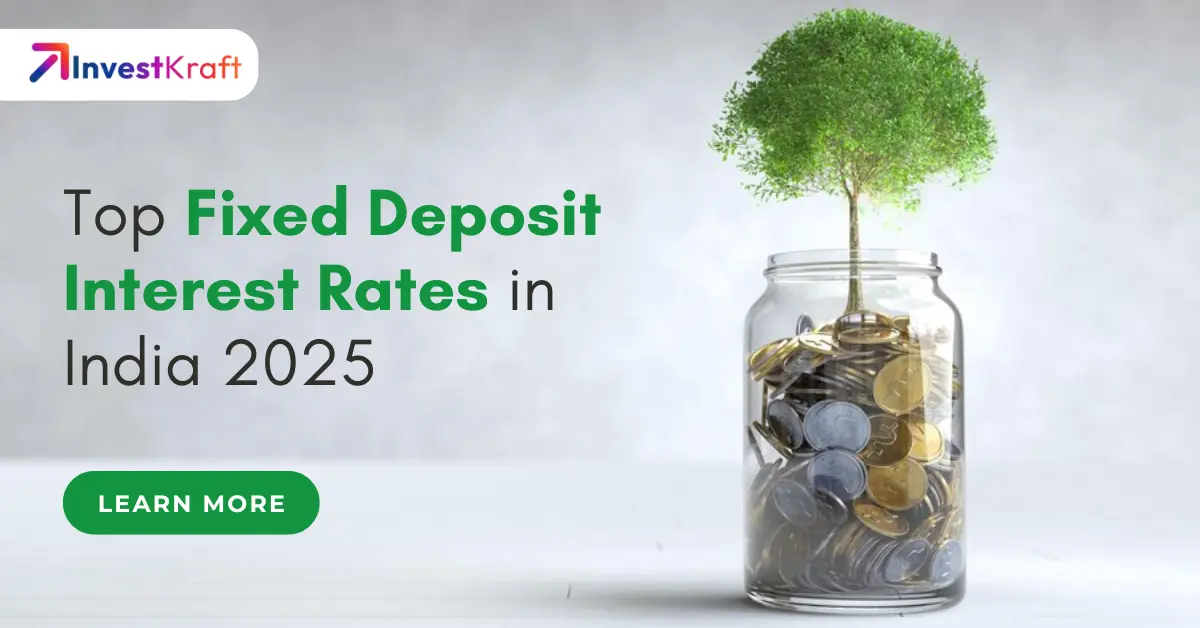
Fixed Deposit (FD) Explained: Best Interest Rates & Investment Guide for 2025
Fixed Deposits (FDs) are a popular investment tool, especially favoured by those seeking a sta...
Read more...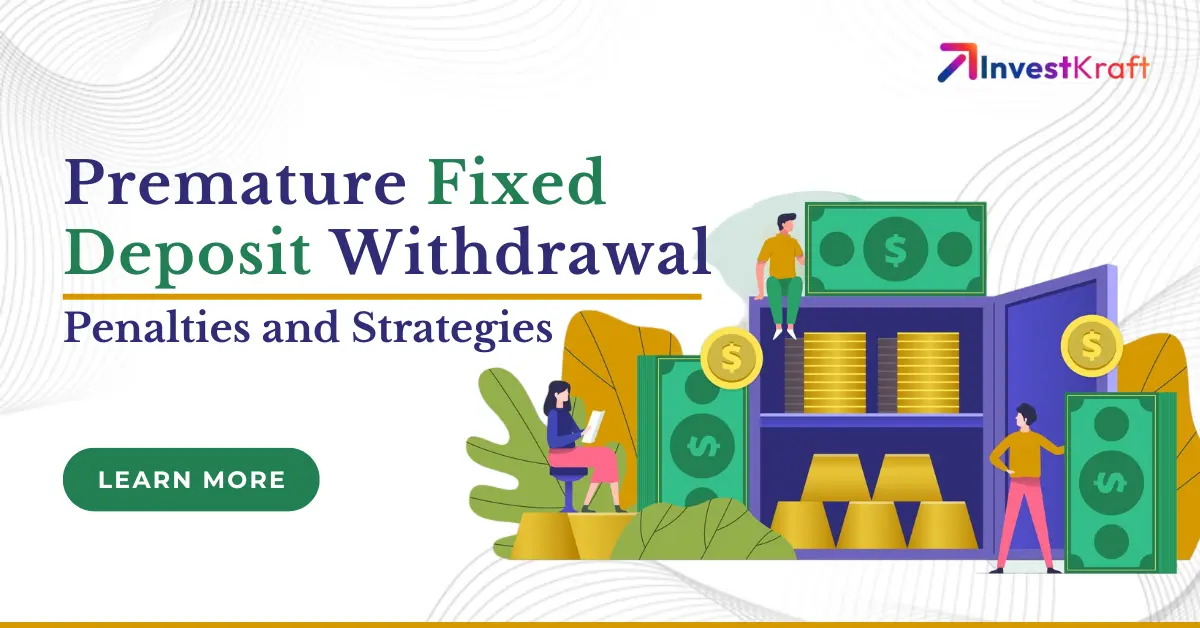
How to Escape from Early Withdrawal Penalties of Fixed Deposits?
Fixed deposits are popular for investing money as they provide security and steady growth. However,...
Read more...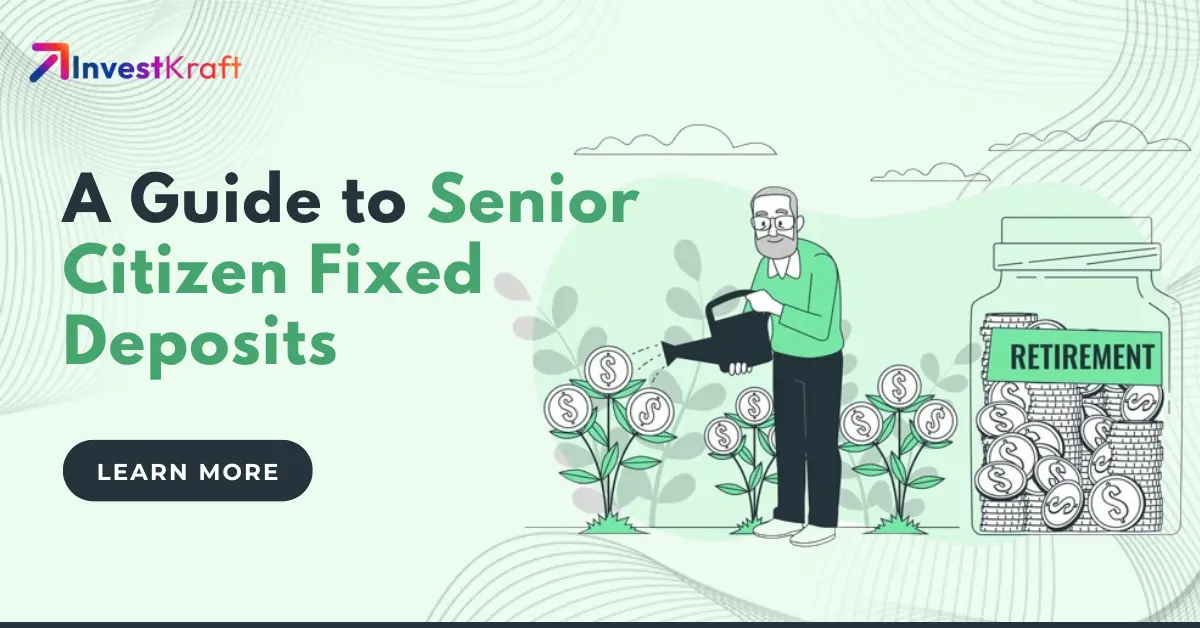
Invest Wisely, Retire Comfortably: A Guide to Senior Citizen Fixed Deposits (FDs) in 2024
The interest rates for senior citizens who invest in fixed deposits can vary depending on factors su...
Read more...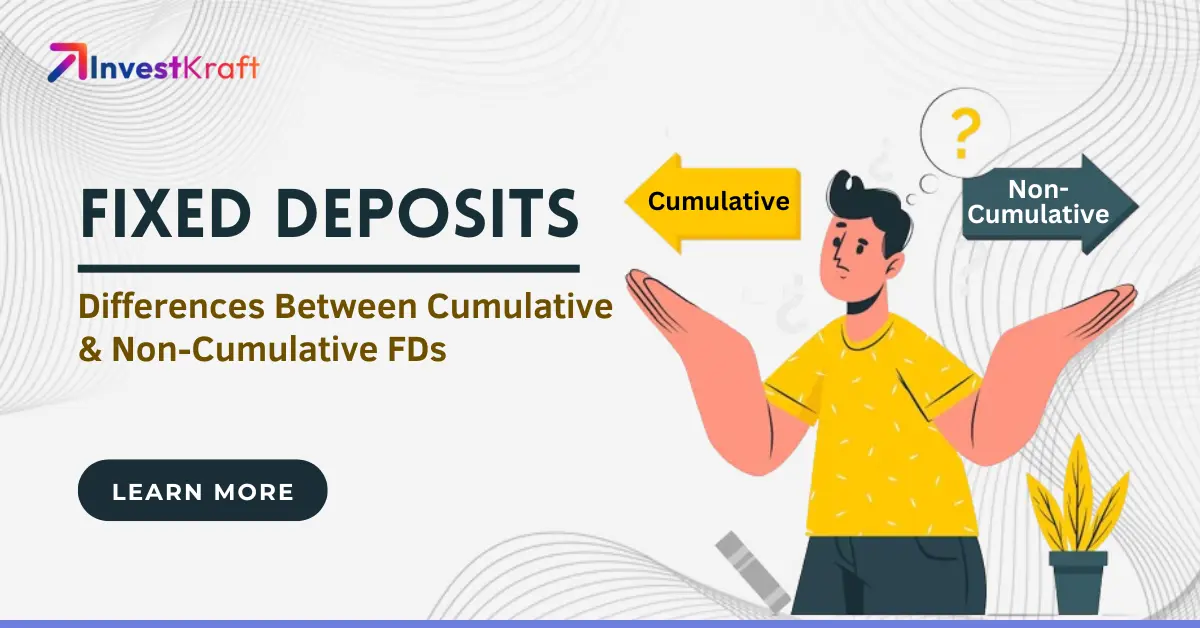
Differences Between Cumulative and Non-Cumulative Fixed Deposits
A fixed deposit is a safe investment option in India that guarantees returns through interest. There...
Read more...
Step by Step Guide to Using a Fixed Deposit Calculator Online
Step by Step Guide to Using a Fixed Deposit Calculator Online, The nicest thing about fixed dep...
Read more...
What Are Corporate FDs and How Different Are They From Bank FDs in 2024?
Fixed Deposits have always been a favourable investment option among investors who look forward to c...
Read more...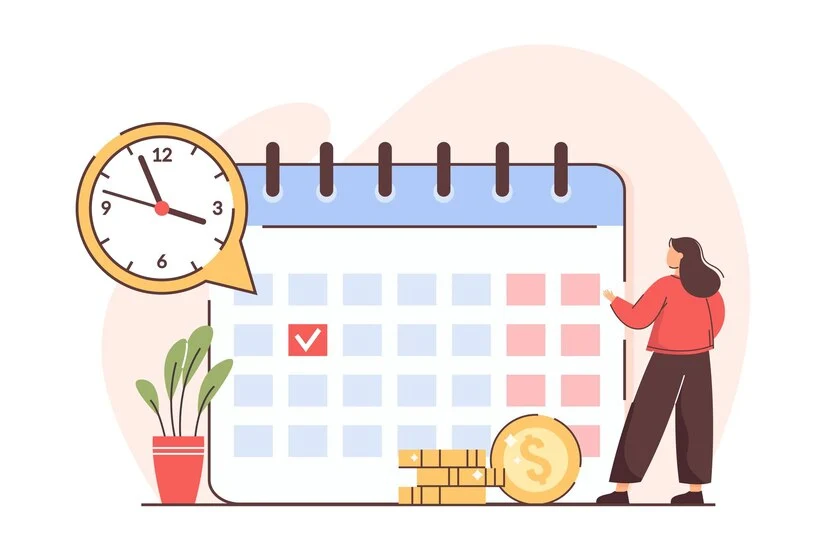
Recurring Deposits (RD) – Benefits, Features, and How to Open RD Account
Among the different types of investment products available in India these days, recurring deposits a...
Read more...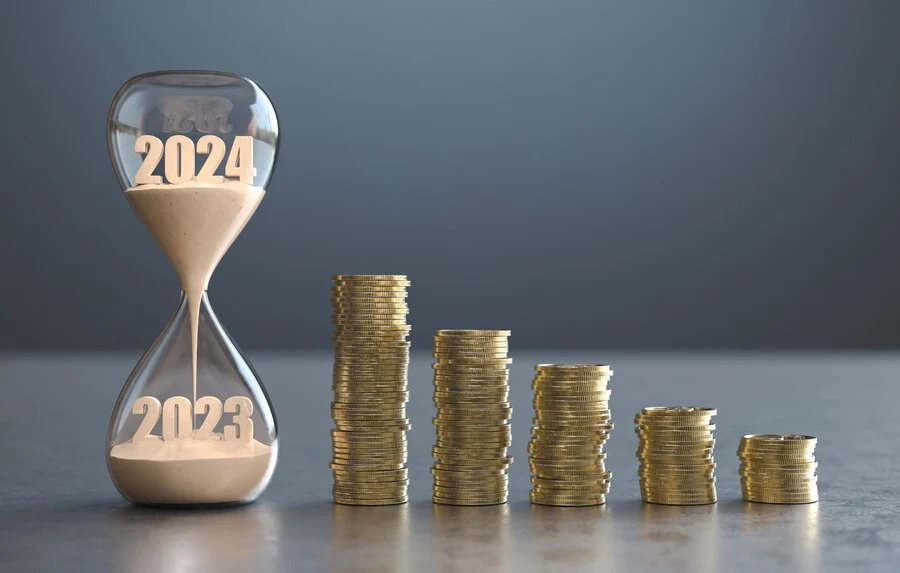
Grow Your Money Safely: A Comprehensive Guide to Fixed Deposits (FDs) 2024
Fixed deposits have been considered a time-tested investment tool to get guaranteed returns on inves...
Read more....webp)
Understanding the Impact of Inflation on Your Fixed Deposit Returns
Fixed Deposits (FDs) are indeed widely favoured due to their stable and guaranteed returns, making t...
Read more...
Comparative Analysis: Best FD Rates Offered by Banks in 2024
When it comes to choosing the safest and most consistent investment avenue in India, a majority of p...
Read more...Reach out to our Experts if you have any Doubts
Like the best things in life, Consultations @InvestKraft are free
Drop a Mail or give us a Missed Call & Begin your Investment Journey here








